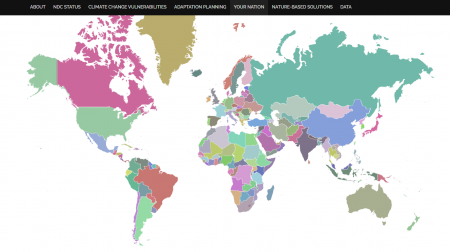Highlighting best-practice for integration of NbS into revised NDCs

The NbSI team are in the process of updating our Nature-based Solutions (NbS) Nationally Determined Contributions (NDCs) Policy Platform. The platform makes information about climate change adaptation planning across the globe openly available, easy and interesting to explore. Pledges are linked to the underlying evidence, and will highlight the prominence of integration of NbS in updated NDCs. The goal is to facilitate the assessment of changes in ambition for Nature-based Solutions to climate change adaptation. Read below three key examples of best-practice for integration of NbS into revised NDCs, and look out for the updated platform coming soon.
Cabo Verde:
Cabo Verde is committed to reverse the trend of habitat degradation, significantly improve biodiversity and restore forests and coastal wetlands by 2030. The country recognises that the loss and degradation of natural habitats undermines the web of life and acknowledges the power of nature in adaptation. Therefore, where possible, Cabo Verde favours nature-based solutions over engineered ones. Cabo Verde has launched its first seagrass protection pilot project in Santiago, ResilienSEA, to promote carbon sequestration, sediment stabilisation and pathogen reduction in coastal waters whilst protecting local endangered species, like seahorses, and people’s livelihood. Cabo Verde is committed to develop a comprehensive seagrass conservation regime by 2024, providing continuity to the existing seagrass inventory project in Santiago.
Chile:
Chile’s submission of their Nationally Determined Contributions demonstrates the country’s recognition that the incorporation of cultural, social and natural diversity in decision making is essential to building a resilient country. The country is committed to the expansion of nature-based solutions and inclusion of indigenous and local knowledge in biodiversity restoration projects. Chile commits to the sustainable management and recovery of 200,000 hectares of native forests by 2030, with at least 100,000 hectares compromising permanent forest cover and at least 70,000 hectares of native species. The country recognises that the reduction of deforestation will decrease the likelihood of landslides, encourage the preservation of biodiversity, increase people’s wellbeing (health, identity, spirituality, emotional balance), increase benefit for culture and tourism, enhance soil protection, improve basins’ water regulation, reduce the severity and extent of forest fires and other natural disasters and support the development of associated communities.
Moldova:
Moldova is committed to incorporate nature-based solutions into adaptation planning and policy development, with a focus on biodiversity conservation, management of ecosystem services and disaster risk reduction. The country’s nature-based vision is evidenced by its 2014-2023 Environmental Strategy, aimed at the protection and restoration of wetland ecosystems to provide the population a sufficient supply of good quality water. The country is also committed to restore degraded forests and pastureland by 2029 thus promoting agricultural productivity, improved watershed function and resilience against harsh weather.
NbSI Intern Darinka Szigecsan has undertaken the core work of updating the NBS Policy Platform as part of a summer internship with NbSI. Darinka assessed revised National Development Contributions (NDCs) and summarised the recent changes and their extent. Darinka is an undergraduate student at the University of Cambridge, reading Natural Sciences. She specialises in ecology and ecological politics, exploring how knowledge about the natural world can be translated into practical solutions used to mitigate the climate crisis.




